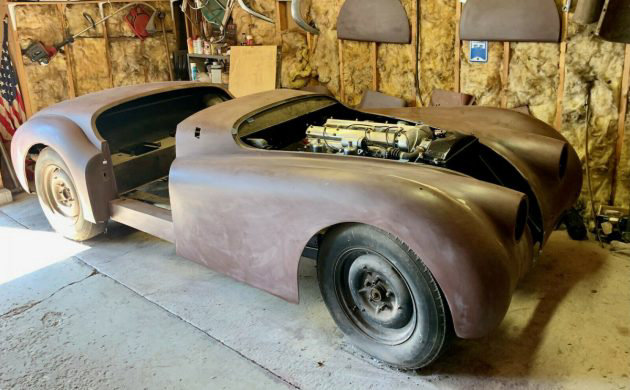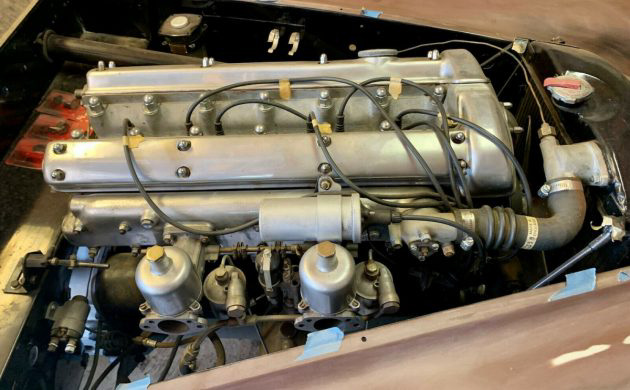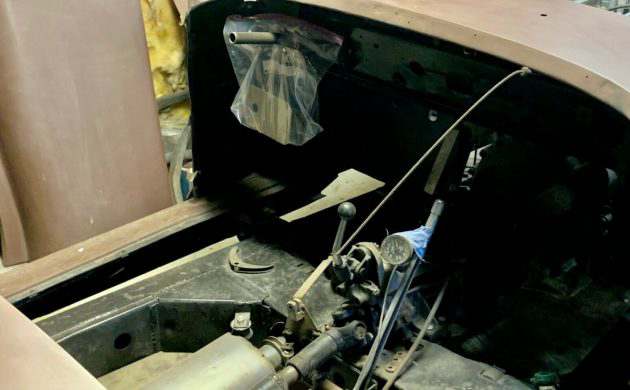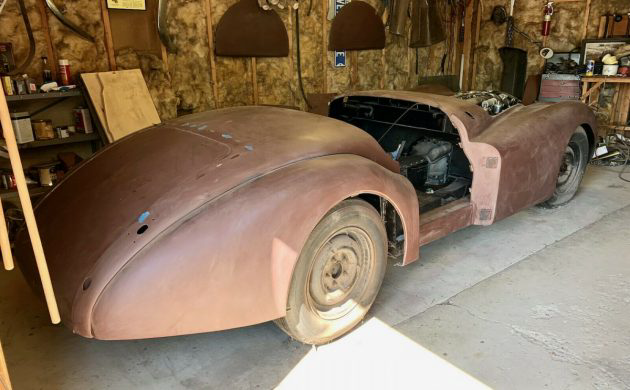Jaguar began life as Swallow, making sidecars for motorcycles. Branching out into sports cars with the Standard Swallow, or SS, they created a new name for themselves in four-wheeled English motoring. The SS Jaguar donated its name to a new generation of sports cars that we know and love today. The XK120 was Jaguar’s first sports car under the Jaguar moniker, and it was no slouch. Its 120 mile per hour top speed made it the fastest production car in the world when it was built. Aluminum used in the body meant it was exotic and lightweight, in addition to fast and sleek. An all-around excellent automobile. This 1951 model can be found here on eBay.
It’s not bad for a project car. Everything that should be there looks to be there. It’s worth mentioning the powertrain situation. The seller states that this is their late husband’s project, and they give an extensive list of everything done to it. I’ll leave the specifics in the listing, but importantly: this car was powered by an XK140 engine when the seller’s husband got his hands on it. It looks like he wanted to restore it to its factory specification; there’s now a proper XK120 inline-six engine sitting under the bonnet, albeit not the one original to the car. The seller will include the XK140 engine that was in it when their husband started working on it, as well as the XK120 engine that’s in it now and a spare 3.4 liter Mark I engine. Three engines for one car isn’t a bad deal.
The originality continues inside, where it looks like the seller’s husband started to reupholster the seats in the original color palette and started re-chroming and assembling all of the interior trim bits. I spy a steering column poking its head out of the firewall, so this looks to be a left-hand drive model.
They don’t include any images of the underside itself, but you can sort of see it in the picture I used for the last paragraph and in a couple of other images. It was originally a California car, and it looks the part. Where you can see bare metal, there is zero rust, rot, or misaligned parts. Left-hand drive means it doesn’t have the same street cred as a right-hand drive Jaguar, but you can quickly put every other English car to shame just by going through your favorite drive-through restaurant. This is a fantastic base for a project–it’s already been started. Now all that’s left to do is finish it.









Just a couple of factoids. Only the first 300 XK120s have hand formed aluminum bodies, after that mostly steel was used except for bonnets. Those aluminum cars are worth 2.5X of equivalent steel bodies. Also, the vast majority of XKs were sold in US and western Europe and therefore are LHD.
Sexy looking car once reassembled and back on the highway IMO. Biggest issue I have with this one is the same as every British automobile: Electrical gremlins. If that issue can be resolved then it could be a lot of fun.
Electrical issues for these cars are generally related to either corroded connectors or breaks in the wiring. From the looks of this restoration, a new wiring harness is included so those gremlins would be reduced or eliminated. From what appears to be a project that was well done and that is well on its way so far, this one will be expensive and likely worth the cost depending on the reserve.
20 years ago a buddy of mine’s dad had a 10,000 mile 70 Hemi 4spd RoadRunner, a 25,000 mile 68 Hemi Auto Charger and three of these. One parts car, one survivor and one with a Tri Power 348 Chevy and a four speed. That car was scary fast according to my buddy, badass looking too with the grey five spokes.
Just bought a quality re-pop grille at $1450.
Parts here alone are worth a lot to a Jag man. You really need to evaluate what’s here in pieces. A lot of value here and basis for a comprehensive restoration…good luck* *Sometimes life is not long enough for all projects to be completed and they need to be passed on. A QUALIY stalled project can be a goode buy.
Item location:
Franklin, Wisconsin, United States